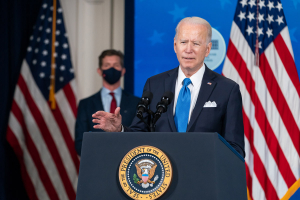Support migrant centric journalism today and donate

The US Department of Labor (DOL) has pledged $100 million in 'tuition-free job training grants' in a bid to help US businesses reduce their use of temporary US work visas, including the popular H-1B and L-1 non-immigrant visas. The grant scheme forms part of America's Promise Job-Driven Grants Program, which was launched by US Vice President, Joe Biden, along with his wife, Jill, on April 25, 2016.
Thomas Perez, the US Secretary of Labor, said: "These grants are part of the Obama administration's commitment to redesigning a modern skills infrastructure in America that engages employers as never before."
A spokesperson for the DOL –a cabinet-level department of the US federal government responsible for Labor Certification and Labor Condition Applications to employ prospective immigrants, occupational safety, wage and hour standards and other employment related matters – outlined the scheme during an interview with CNSNews.com.
"The scheme will connect tuition-free job-training/education programs with employers to create apprenticeship curriculums," the spokesperson said. It's understood that the curriculums will aid the development of specific industry skillsets across each US region to ensure that workers are qualified for jobs at different companies.
Sanwar Ali, Editor of workpermit.com News has the following comments to make:
We wonder whether this is more of a political move rather than anything else. It remains to be seen whether these grants will make much difference when it comes to reducing the need for workers on L-1 and H-1B visas.
The Center for Immigration Studies (CIS) and Federation for American Immigration Reform (FAIR) have commented on the program and as usual are attacking the H-1B and L-1 visa programs. We need to be careful that we do not take what these organisations say too seriously. We have found numerous factual mistakes in reports published by these organisations. This should be taken into account while reading the comments below. Unfortunately, some people in the media treat reports by CIS and FAIR as being accurate.
$100 million raised from H-1B visa fees to be used for training
Money to fund the grants will be raised from the fees paid by US companies using the H-1B temporary work visa program, which enables them to bring foreign workers into the country. Between 20 and 40 four-year grants are expected to be awarded, with each one likely to be worth anywhere between $1 million and $6 million.
However, the DOL has set a series of strict guidelines, which must be met by companies in order to obtain any grant. A DOL statement said: "For each sector and service area, partnerships must include the public workforce system, an economic development agency, at least one education and training provider and at least five employers or a regional industry association."
The DOL has suggested that as more US businesses commit to training American workers, they will be less dependent on H-1B and L-1 temporary US work visas to obtain staff with the desired skillset.
US H-1B temporary work visa attacked by "extremist" CIS and FAIR
The H-1B visa enables US companies to recruit overseas workers, with a bachelor's degree or equivalent, to fill 'speciality' jobs. US congress limits the number of H-1B visas made available to 85,000 per year, 20,000 of which are set aside for foreign students graduating from a US educational institution, such as a college or university, with a postgraduate degree.
Fellow at the anti-immigrant Center for Immigration Studies and a former assistant for farm labor to the Secretary of Labor, David North, said: "It is 'commendable' for the federal government to use foreign worker fees to train American workers."
However, North expressed reservations with the H-1B program, stating that he is more concerned with what he claims are abuses within the program, and said: "There are many resident workers with solid STEM skills in the US, but companies prefer younger, cheaper, more docile foreign workers, and sometimes break the law to make use of them."
Media director at the Federation for American Immigration Reform – another anti-immigrationnon-profit organization that comments on US immigration policy - Ira Mehlman, said: "It is 'reasonable' to create public/private partnerships to help people improve their job skills."
Without going into the specifics of the DOL's new grant scheme, Mehlman claimed that US companies are under the impression that they don't have a duty to invest in worker training because of the availability of foreign labour. He slammed some US companies for treating the US government as a 'giant personnel agency that would happily oblige when their company needed workers.'
Mehlman was equally critical of the government, saying: "The government needs to be more cautious when issuing H-1B visasto prevent companies using H-1B workers at the expense of American workers."
In response to Mehlman's criticism of the US government, the American Immigration Council (AIC) - a non-profit, non-partisan, organization based in Washington D.C, which exists to 'promote the prosperity and cultural richness of the US' – argued that 'American and foreign workers aren't necessarily competing for a fixed number of jobs.'
According to the AIC, 'across the US economy, H-1B workers positively impact the economy and the employment opportunities of native-born workers.'
Professor of public policy at Rutgers University, Hal Salzman, countered the AIC's argument. In an interview with the Chicago Tribune, Salzman claims that most H-1B visas are issued to foreign workers without the so-called, 'exceptional skills.' He said: "There's really no shortage of IT workers, just those available at a discount."
Perhaps some of the remarks by the Professor are misleading. There Isno requirement to show "exceptional skills" for an H-1B visa. You need to show that it is a "specialty" occupation. You also need to pay the "prevailing wage" which surely means that it is difficult to obtain workers at a "discount" under the H-1B visa scheme. Professor Salzman is known to have anti-immigration views.
Workpermit.com can help with US employment-based visas
If you would like to apply for a US work visa – including L-1 visas, E-1 and E-2 visas, and H-1B visas - WorkPermit.com can help. WorkPermit.com is a specialist visa consultancy with over twenty-seven years of experience dealing with visa applications. We can help with a wide range of visa applications to your country of choice. Please feel free to contact us for further details.





















